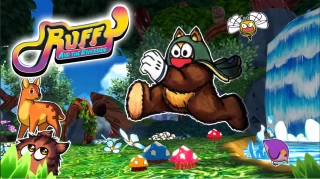“I have to believe that I can do this.” – Madeline, Celeste
We live in an age without standard. Every day the news cycle churns out another scandal or misdeed perpetrated by those in power. Social malaises thought to be banished to history have returned, as hateful and consuming as they were before. The very nature of social media has created a culture in perpetual flux, as it has created new ways to communicate — and new ways to belittle, to deride, and to mask ourselves.
For those in my generation — the listless group of 20 and 30-somethings who have risen to adulthood amidst political chaos, financial woe, and technological upheaval — the toll taken has been greater than many realize. The most ubiquitous joke among my peers is waiting for sweet oblivion to take us away from this fetid reality. Financial stability and security is treated as a myth, a false promise meant to assuage the very real student loan debts many incur. I know many people — including some of my closest friends — who battle depression, anxiety, and other demons on a daily basis.

I would be lying if I said I wasn’t affected by the age, either. This June I graduated from college with no career in sight and only a semblance of what to do with my life. The job market for my fields of study proved barren, and there was a time where I found myself in a major bout of the doldrums. And even after escaping the worst of my gloom, the anathematic aura that seems to permeate this era is inescapable. In such a forlorn time, it’s no wonder that video games proved to be one of my great escapes.
But there were some titles this year that proved to be more than a bout of escapism. Replaying Undertale on Switch reminded me of the difficulty — and necessity — of being a good person in times of strife. Wandersong imparted an ideal of hope and idealism even when combated with absolute despair. Non-Switch title and humanist treatise NieR: Automata questioned the pointlessness of existence — and suggested, paradoxically, that futility imbibes it with meaning.

But when it came to processing my emotions — my despair, my dilemmas, my understanding of myself and the world — there were three titles in particular that pushed me through. Each of them is an indie game I’d count among the year’s finest, and ones that I think will not only persevere because of their raw artisticness, but because of their value in this time, this age. They weren’t necessarily the absolute best three I played this year, but they were perhaps the most important. These are the three indie games that defined my 2018.
GRIS – Overcoming Grief
I first caught wind of GRIS sometime in the summer, and was immediately captivated by its flawless aesthetic, to the point that I was giddily awaiting its release right up until the point when I reviewed it. And while that review communicated much of the game’s finer points, I think I undersold just how hard-hitting this artistic masterpiece from Conrad Rosett and Nomada Studio truly was. GRIS’ power lies in the abstract and the visual, substituting complexity of idea for intricacy of emotion.
The game begins by subjecting its titular heroine to some eldritch, allegorical trauma, one that takes her voice, her place, and all the color in the world. For the first couple minutes, the only action she can take is morosely moseying through an empty, colorless void, occasionally stopping without player impetus to break down and cry. But only a short time later, she wipes away her tears, affirms herself, and sets out into the world with the mission to rebuild it.

GRIS is quite transparently about the process of grief — not only does it say so in the game’s description across all platforms, but you can find hidden broken statues throughout the game that are named after the stages of grief (denial, anger, bargaining, depression, and acceptance).
But what I found striking about Gris’ journey was that it was not an even slope — rather, it was a zig-zag of positivity and negativity, as punctuated by unadulterated beauty as it is moments of trepidation and sorrow. Each time a color is restored to the world, Gris curls up into a ball in mid-air, soft piano chords resonating through the sky as reds, greens, blues, or yellows return. Quietude is often interrupted by the presence of an amorphous, shadowy beast, a stand-in for her trauma that is unrelenting in its pursuit.
Warning: Spoilers in the next paragraph, skip if you wish to be unsullied.
And at the end of the game, Gris appears to be within reach of her goal, only to be nearly consumed by that shadow — by her grief. Even as she closes in on the end, she’s about to be swallowed whole when her song of healing penetrates the darkness, casting aside her anguish and leaving a starry road into the unknown. And rather than show us her life afterwards, the game simply… ends. Gris moves on into a sea of white, her future ambiguous and unknown.

Rather than present the healing process as a gradual and incremental thing, GRIS strikes true because it acknowledges that overcoming past pains is rarely so simple. Even as you improve on the whole, you may have bouts with yourself, and face even greater struggles than before. But pushing forward — discovering a world of color and wonder, devoid of monochromatism — is worth the effort.
The Missing – Overcoming Pain
This is the only game that’s gone largely uncovered on Nintendo Wire to this point, and for letting that happen I feel nothing but shame. The latest game from Swery65, the quirky Japanese auteur behind Deadly Premonition and D4, The Missing: J.J. MacField and the Island of Memories (say it five times fast) is bizarre, haunting, and one of the most painful games I’ve ever played — though I mean it with nothing but the utmost praise.
The titular J.J. travels to the mysterious Island of Memories with her good friend and love interest Emily, where the two share intimate moments around the campfire. Upon waking, J.J. realizes that Emily is missing, and heads off in pursuit — only to be struck by lightning and die. At least, that’s what it appears to be at first, as it turns out that J.J. now has the ability to regenerate her body from death’s doorstep. So she sets off in pursuit of Emily, on an island filled with nightmarish beings and horrifying obstacles.

The crux of The Missing’s gameplay revolves around inflicting pain upon yourself to move forward. Whether it be moving your limbs around on weights to open the path, setting yourself on fire to clear plants, or breaking your neck to flip gravity, nearly every step of every puzzle involves J.J. receiving massive amounts of damage. And the game doesn’t sugarcoat this — every animation, every sound effect, every high-pitched scream of pain that J.J. lets out is drawn out and visceral, inflicting a denoted sense of violence and brutality. Watching her limp along with charred skin or crawl helplessly along the ground without limbs somehow manages to be heart-wrenching as you continue, and even watching her head gruesomely roll along is not so much funny as macabre. But there’s no other way to progress.
Yet the game has more to it than simple physical pain. Conversations through J.J.’s phone reveal much of her personality and relationships with those around her, revealing a smart yet vulnerable girl who struggles to connect to her parents. It’s clear just how much she loves and cares for Emily, and how her absence affects her psychologically and emotionally. And as the game goes along, the pain she inflicts upon herself has another layer added — one disturbingly real and honest in relation to real world issues.
At a glance, the message of The Missing appears straightforward: “work through the pain for those you love.” But while the majority of J.J.’s tribulations are certainly meant to be surreal metaphors for her inner problems, the true horrors are revealed in how certain parts of the world view her — and how she finds that “the missing” refers to a piece of herself, an understanding that she tries and fails to obtain. But towards the end of the plot, the nature of the conflict shifts — no longer is J.J. a passive receiver of violence, but someone in pursuit of finding her best friend and her best self.

I don’t wish to spoil The Missing for anyone, because I truly think this is one that can only be experienced rather than told. It’s definitely not palatable for everyone, but for those who can stomach the viscerality and don’t mind a bit of surrealism, it’s a must-play, as it imparts quite a lot about the nature of pain, loss, and acceptance. Each time you boot it up, it shows the disclaimer: “this game was made with the belief that nobody is wrong for what they are.” And as bigotry still festers on society’s underbelly, that’s a powerful thing to state.
Celeste – Overcoming Yourself
The best game of 2018 is no mere platformer. Sure, Celeste has perfect level design, a pleasant aesthetic, a boppin’ soundtrack, and a whole lot of challenge, but that’s not what makes it one for the ages. It’s one of the finest examples of using gameplay to communicate and support narrative ideas, and it does so in service of a much-needed story and idea.
Celeste stars Madeline, who has traveled to the eponymous Celeste Mountain in order to climb it. At first she offers no clear explanation as to why she wants to make the climb, and is warned that doing so will make her confront parts of herself that she may not want to. But she begins her ascent, and in doing so creates a corporeal materialization of her darker side (nicknamed “Badeline” non-diegetically). This darker self lashes out at others, derides her for her efforts, and generally makes her journey hell.

Celeste showcases Madeline’s struggle not just through the presence of Badeline, but through the very nature of its design. It can be a difficult, tasking game… but it’s never punishing about it, instead being liable to let you quickly respawn and give it another go. There are times when it feels like you’re obstinately butting your head against the same obstacle over and over again with no progress. There are times when you get frustrated and angry and you want to quit. But the game is there to encourage you, to see you push through the obstacles and arrive at your goal. And the literal main mechanic is a mid-air boost — the little bit of extra push needed to get you to where you need to be.
But what makes the narrative truly sparkle is the fact that it preaches self-love in an extremely productive, conducive way. Madeline struggles so much because she tries to reject and do away with her other self, rather than trying to manage her depression and work together with Badeline towards a common goal. The pivotal moment of the game is when she confronts her other self not with derision, but with acceptance. At that point she gains double the boosts in midair. With a resolved and unified heart, the two climb the mountain to its summit, where Madeline looks out from the summit quietly, her goal accomplished. She’s proven she has the capability to do whatever she needs to. Can’t you do the same, player?

The interlocking mechanics and messages of Celeste are heartfelt, earnest, and encouraging. It pushes, but doesn’t demand. It encourages, but doesn’t hound. It maintains an emotional vulnerability without devolving into moralistic slop. And what it conveys is something that can only be expressed within a video game. That’s what gives its ideas power — the notion that the player can accomplish what they put their mind to is strong because the player has already done that. That’s more than any movie, TV show, album, or book can do, simply by the nature of the medium.
If you hold on life won’t change
Looking at these three games collectively, there’s a number of similarities they share, both superficially and thematically. All star female protagonists dealing with some sort of intense personal problem. All three of them deal with abstraction or metaphor to a great extent. Some focus more on particular social issues — The Missing deals greatly with LGBTQ+ matters, while Celeste is overtly about mental health.
But the undercurrent to all these games is the idea that your actions matter; that your willpower is valuable in making yourself a better person. Whether it’s moving on from your past grief, or finding a missing piece of yourself, or even just… climbing a mountain. You don’t have to remain stuck. You can change for the better.
We often like to romanticize art as life changing or transformative, as if encountering one piece of media will forever change the way we perceive life, ourselves, and the world. The truth is that’s rarely the case — and when it is, you usually don’t realize it until years later. As much as I loved these three games and thought they were impactful, I can’t speak as to whether or not they’ll truly change me. I still struggle. I still wallow. I still get stuck.

But when that does happen to me, I think of that last C-side in Celeste, the core, and how I spent hours — literal hours — on the final screen before finally reaching the end and snatching the heart crystal. I think of Gris passing into the ether to live her newfound life. I think of J.J. sobbing as she finds what she’s been looking for all along. And a part of me remembers that the effort is worth it.
Video games can provide idle escapism from real world problems. I’d argue that’s for the better, sometimes — we all need moments when we can just get away from it all and relax for a few hours. But other times, they provide challenges — a way to confront our pre-established notions, a method by which we can grow to understand ourselves and the world a little better. That’s what makes them art. That’s what made these three games the defining ones of 2018 — by acknowledging the struggle, patting you on the back, and saying: “It’ll be ok. You’ll make it through this. I know you will.”
Leave a Comment


